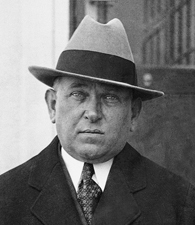H.L. Mencken, the “Sage of Baltimore,” was an outspoken journalist whose caustic tongue and scathing criticism of many segments of American society inspired anger and devotion among readers.
H.L. Mencken’s Early Days
Henry Louis Mencken was born September 12, 1880, in Baltimore, Maryland. At age seven, he received a printing press for Christmas and became enraptured with the device. Because the press had a broken “r” key, Mencken began writing his name as “H.L.” rather than “Henry” or “Harry.”
After graduating as valedictorian from Baltimore Polytechnic Institute in 1896, Mencken worked in his father’s cigar shop until the elder Mencken’s death in 1899. Mencken soon asked for and received a job at the Baltimore Morning Herald, where he displayed a range of writing, utilizing slang and satire, and composing short stories and humorous pieces.
Sources in this Story
- The Baltimore Sun: H.L. Mencken, pioneer journalist
- Encyclopedia Britannica: H.L. Mencken
- The Internet Archive: Full text of “Coverage of The Scopes Trial by H.L. Mencken”
- The Atlantic: Mencken: America’s Critic
- H.L. Mencken House: About H.L. Mencken
Mencken’s Journalism and Other Works
In 1906, Mencken began working for The Baltimore Sun, and produced work for the paper for most of his career. With George Jean Nathan, Mencken was co-editor of a humorous magazine called The Smart Set, and the duo also founded American Mercury magazine in 1924.
Encyclopedia Britannica writes, “Mencken was probably the most influential American literary critic in the 1920s, and he often used his criticism as a point of departure to jab at various American social and cultural weaknesses…He jeered at American sham, pretension, provincialism, and prudery, and he ridiculed the nation’s organized religion, business, and middle class (or ‘booboisie’).”
Mencken’s most famous work occurred during the Scopes trial of July 1925, in which a teacher was tried for teaching evolution in the small town of Dayton, Tennessee. His acerbic wit was in full effect. In one article that discussed the religious devotion of Dayton’s citizens, he wrote, “To call a man a doubter in these parts is equal to accusing him of cannibalism.”
Mencken’s role in the Scopes trial was immortalized in the play “Inherit the Wind,” and in its film adaptation featuring Gene Kelly as Mencken.
Mencken was also known for his study of language, particularly his examination of the evolution of the English language in America. His 1919 book, “The American Language,” which was supplemented and reissued many times, “playfully ridiculed American speech while painstakingly cataloguing its unique expressions and words,” describes The Atlantic.
The Rest of the Story
Mencken, who was of German decent, held sympathies for Germany in both World Wars. He has been accused of being racist and anti-Semitic; even George Nathan, Mencken’s co-editor at The Smart Set, conceded, “I guess it would he right to say that he never wholly liked Jews. He respected them, he was amused by them, he was even afraid of them, but he didn’t like them.”
On the other hand, Jewish publisher Alfred A. Knopf considered Mencken a “charming” friend, “sentimental, generous, and unwavering—sometimes almost blind—in his devotion to people he liked.” Mencken was also one of the first journalists to criticize President Franklin Roosevelt’s refusal to allow Jewish refugees into the country.
In 1930, following the death of his wife Sara Haardt, Mencken moved back into his childhood home at 1524 Hollins Street in Baltimore, where he completed a great deal of his work in a study on the second floor of the house. As he aged, he was drawn to the garden “to smoke a cigar and look at the stars,” particularly after suffering a stroke in 1948.
This article was originally written by Sarah Amandolare; it was updated September 3, 2017.











